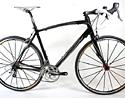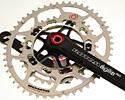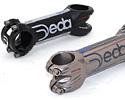
Recently on Cyclingnews.com |
New Arrivals – February 21, 2007Edited by James Huang Got Tech? Send press releases, news, and tech questions to the Cyclingnews tech-heads. Welcome to New Arrivals, a section showcasing the latest equipment that's landed on the Cyclingnews tech desk. Look out for reviews over the next few months when we've clocked up some saddle time with this stuff.
Deda Elementi Zero100 Servizio Corse stemAluminum stems continue to trump carbon fiber in terms of weight, and Deda's new Zero100 Servizio Corse stem provides more evidence on the case. Our 110mm long test sample weighs just 126g (only 142g for a 120mm version), yet boasts 3D forged aluminum construction for more precisely aligned grain orientation than CNC machining. A full complement of 6/4 titanium hardware secures the oversized four-bolt faceplate and steerer clamp and contributes further to the gram shaving. The Zero100 is only available in a single 82° angle, but a wide range of extensions from 80-140mm in 10mm increments as well as two finishes, including Deda's new 'dark metal polish'. Price: US$150 |
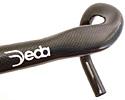
|
Deda Elementi Electa handlebar
Unlike with stems, however, carbon fiber continues to rule the roost in the high-end handlebar department. The new Deda Electa takes advantage of the material's enormous design flexibility with a heavily sculpted upper section that suggests long-haul comfort along with a relatively deep 140mm ergonomic drop. Brake and shifter (depending on setup) lines are internally routed, but in a thoughtfully clever and well-done fashion that should satisfy riders and mechanics alike.
The Electa is offered in three widths (42/44/46cm outside-to-outside) as well as two graphic options: a fairly standard white lettered version in addition to a bolder 'red flame' versions. Weight on our 44cm test sample is a competitive 230g.
Price: US$375
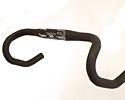
|
Deda Elementi Supernatural handlebar
Deda Elementi designed its aluminum Supernatural handlebar to fit specifically with Shimano's newest generation of STI levers in order to provide a smoother transition from the tops to the hoods and an easier reach from the drops. Triple-butted 7075-T6 aluminum construction yields a reasonable 254g weight for our 44cm (outside-to-outside) test sample. The oversize diameter Supernatural is offered in an impressive five widths (40/42/43/44/46cm, o-o), all of which feature an 80mm reach and 132mm of drop.
Price: US$115
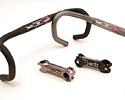
|
Deda Elementi Newton handlebar
Ok, so Deda's Newton handlebar is far from 'new' as it's been on the market for several years now, but Deda has freshened up the look of its premier aluminum offering with two new looks, including a particularly sharp 'dark metal polish' finish. Conveniently, both also match perfectly with the company's new Zero100 Servizio Corse stem.
As with Newton handlebars of yesterday, the Newton is constructed from triple-butted 7075-T6 aluminum. Deda offers the current Newton in three distinct bends (anatomic, traditional shallow, and traditional deep) and four widths (42/43/44/46cm outside-to-outside), but now just exclusively in the oversized 31.7mm clamp diameter. Our 44cm test samples weigh a reassuring 258g each.
Price: US$115
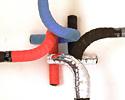
|
Deda Elementi Tape handlebar tape
While Deda may not have graced its handlebar tape with the most imaginative name, it does offer it in what is possibly the widest array of colors in the industry. A full twenty hues and textures are available, including faux black and silver carbon, clear, and a retina-burning chrome (be sure to bring your good set of legs if you show up on a group ride with that stuff… same rule applies for white shorts). Save for the clear and chrome flavors, all of the Deda Tape varieties seem well-padded and include embossed 'Deda' logos. Finishing tape and 'cheater strips' are included, along with bar end plugs.
Price: US$12 (colors); US$25 (chrome)
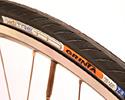
|
DedaTre Grinta clincher tires
Those of you still caught in the cold snowy embraces of winter (myself included) may only be able to dream longingly of outdoor riding. Once things begin to thaw out, though, Deda Elementi's tire division, DedaTre, claims to hold an ideal clincher tire in its quiver when it comes time to pile on the base miles. The Grinta sports a long-wearing high durometer rubber compound with two types of grooves: a wider one for dust and residual road grime, and narrower ones for siping away water. In spite of its 'training tire' classification, the Grinta is still reasonable in the weight department: our 700x23c test tires average 234g a piece, varying just +/- 9g across two pair, and we'll report shortly on how these hold up.
Price: US$20
Photography
For a thumbnail gallery of these images, click here
Images by Paul Henderson-Kelly
- Tom Boonen will be piloting the Specialized S-Works Roubaix SL on the cobbles of the Spring classics this year, and we'll be doing our testing on many of the same sections of pavé (albeit much more slowly).
- Specialized says its elastomeric Zertz inserts neutralize high-frequency vibrations before they reach the rider.
Images by James Huang/Cyclingnews.com
- The Ágilis is Rotor's first complete crankset offering since the RSX4 series, and is available pre-configured with its excellent elliptical Q-Rings.
- The new Zero100 Servizio Corse stem from Deda carries a long name, but few grams.
- Deda's curvy Electa carbon fiber handlebar promises a comfy ride thanks to heavily shaped tops and ergonomic drops.
- The upper section of the Electa bar is sculpted to distribute pressure and provide long-term comfort.
- Brake and shifter housings are routed internally but should be easy to feed through.
- The Supernatural from Deda is specifically designed to fit Shimano's newest generation of STI levers.
- The venerable Newton carries on for 2007 but with new finishes, including a particularly gorgeous 'dark metal polish'.
- Deda's aptly named Tape is offered in nearly two dozen hues, including a blindingly bright chrome.
- The DedaTre Grinta training tire is aimed directly at wet and dirty roads for packing in early season miles.

